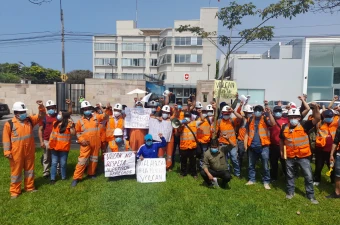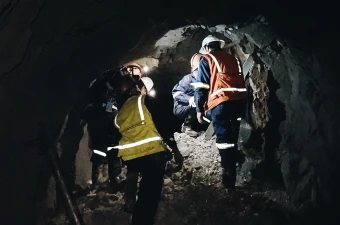Opportunities for just energy transition
After having accepted the invitation of the miners' unions, the Ministry of Labour visited the mining region in the north of Colombia. The region mainly produces open-cast-mining coal, which now finds its way in large quantities to European power plants.

The main topic of discussion was the miners' complaints about monitoring of health and safety protocols.
The Ministry's visit, from 16 to 19 August, was initiated by the main miners' unions together with the Colombian National Commission for Occupational Health in the Mining Sector.
It seems that President Petro's new government is listening more to the workers and their trade unions.
New government
This visit was important given the recent change of government in Colombia. Under previous governments, government enforcement of labour laws and regulations was particularly problematic.
Regional coordinator Maurice van Beers is hopeful: "The new government of President Petro seems to be changing this and listening more closely to the workers and their trade unions."
This is the opportunity for all parties - trade unions, mining companies and European energy companies - to take responsibility for a responsible energy transition.
Work-related risks
Following previous inspections, the Ministry established working groups to monitor compliance with occupational risk regulations. The working groups include representatives of the government, workers and employees. They work on improvement and mediation as well as prevention.
Glencore mine refuses to engage in dialogue
Unfortunately, one of the largest mining companies, Carbones del Cerrejón, owned by Swiss multinational Glencore, continues to refuse to participate in the dialogue with the government, which is crucial to improve conditions in the region and also to manage the energy transition in the mining region.
Orlando Cuello, leader of trade union Sintracarbón, responds that previous consultations with Carbones del Cerrejón/Glencore "have not led to improvements, especially in the area of health. Despite the fact that they did listen to us, there appears to be no will to change the situation of the workers. "
The miners' unions are alarmed because even during the visit of the delegation from the Ministry of Labour, mining company Carbones del Cerrejon/Glencore continued to refuse to participate in the dialogue between employers, workers and the government.
Just transition
Maurice van Beers, regional coordinator of CNV International, is hopeful: "The new government of President Petro has social dialogue high on its agenda and seems to really want to work on it.
Also the theme of just transition (fair energy transition) is considered increasingly important. This is the opportunity for all parties - trade unions, mining companies and European energy companies - to take our responsibility to achieve a responsible energy transition.”
World Coal Market
Recent developments in the world coal market have had far-reaching consequences for mining in Colombia. CNV International is committed to a fair energy transition. To this end, the main mining unions in Colombia decided to join forces in a workers' collective in 2021, on the initiative of CNV Internationaal.
The immediate cause was the abrupt closure of one of the mining sites by Swiss multinational Glencore. Together, the unions are working for a socially just energy transition.
The economy of la Guajira, the mining region in the north, is almost entirely dependent on mining. Glencore subsidiary Carbones del Cerrejón, is one of the largest companies there and alone is responsible for an estimated 43% of the region's revenues.
Learn more
Publication date 25 08 2022


